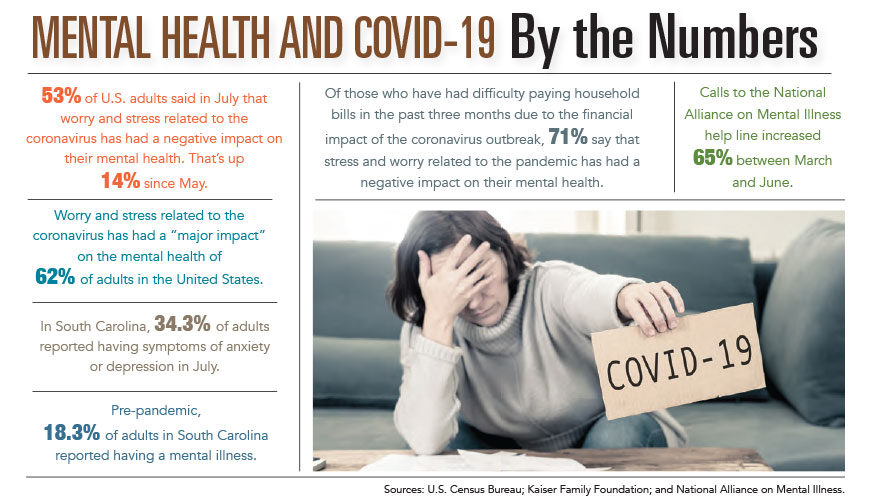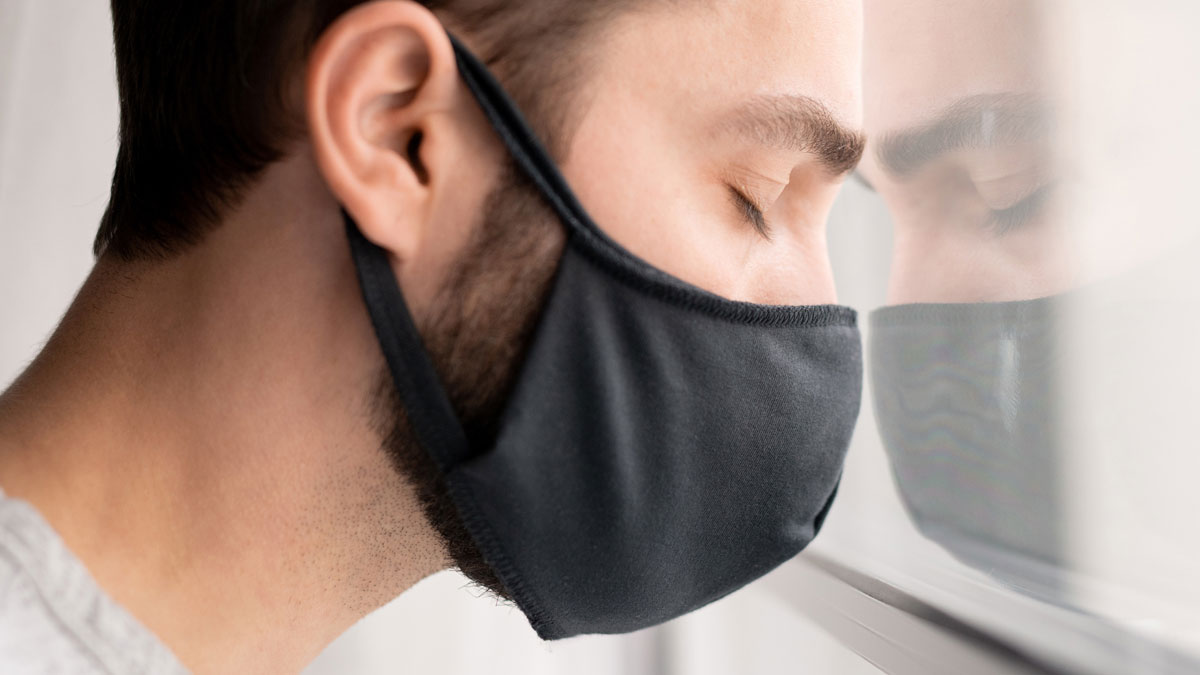As the coronavirus pandemic continues to turn our lives upside down, it doesn’t surprise Dr. Anne Marie Albano that an increasing number of people are experiencing new or worsened mental health struggles.
“The first thing that comes to my mind is a quote from Holocaust survivor and Austrian psychiatrist Viktor Frankl,” said Dr. Albano, executive director of Moderns Minds, a mental health and wellness center in downtown Charleston. “He said, ‘An abnormal reaction to an abnormal situation is normal.’ Obviously, this pandemic has caused incredible disruption in all facets of life.”
Since mid-March, life has been a succession of altered daily routines, changed work and school arrangements, financial pressures, limited social gatherings, and, for some, a fear of getting sick.
According to a recent Kaiser Family Foundation poll, the pandemic had negatively affected the mental health of 56% of Americans. More than 36% of adults in the United States reported symptoms of anxiety and depressive disorder in June, the foundation said.
Children are being affected, too.
Dr. Lance Feldman, a child psychiatrist and director of pediatric behavioral health at the Children’s Medical Center in Greenville, has seen a “definite uptick” in anxiety in children. Struggles in school often prompt parents to consult child psychiatrists. Dr. Feldman said in normal years, summer and the early part of the school year are typically slower for him because students are attending camp and other summer activities and families are on vacation.
“Usually, the last person you want to see in the summer is your child psychiatrist,” he said, adding that that has changed during the pandemic. “We ended up starting the clinic a few months ago because, at times, the pediatricians were being overwhelmed and spent half their day seeing children with anxiety and behavioral concerns.”
Feldman is seeing a ripple effect from the pandemic, which is forcing children to spend a lot more time at home and parents into teaching roles – an increased number of children with concerns about acting out and difficulties with focus and concentration.
“In a much less structured environment, we’re seeing a lot more kids who are struggling,” he said.
Based on what happened after other disasters, Dr. Albano expects about 10% of the adult population to develop psychological problems following the pandemic. After the 2003 outbreak of SARS, another respiratory illness caused by a coronavirus, there were many cases of post-traumatic stress disorder in survivors, health care workers and people quarantined for lengthy periods, especially those with little to no social support network.
A study published online in late July in the journal “Brain, Behavior and Immunity” found most adults hospitalized for COVID-19 suffered from at least one mental health disorder a month after treatment. The researchers from Vita-Salute San Raffaele University in Milan, Italy, recommended that COVID-19 survivors undergo a mental health assessment as part of their recovery.
So how do you tell when the stress is too much?
Dr. Albano said the first step is to take stock of your feelings – both mental and physical.
“Since March, what have you been feeling? Which feelings are different than prior to working from home? Which feeling is predominant?” she asked.
Then it’s time to analyze your tension and stress levels, whether you’re in pain, how you’re sleeping and if you’re able to relax: “Then step back and decide what has to change. Now that you’re working from home, are you working from 6 a.m. to 7 p.m.? How much movement is in your life? Are you seeing people?”
Brian Durbin, director of programming at Synchronicity, a health and wellness club in Mount Pleasant, said major disruptions in life are opportunities to re-evaluate what’s important.
“It’s like a forced time out,” he said. “You can decide what gets put back in your life and where your priorities are.”
Having structure and focusing on what you can control helps, too, Durbin said.
“You can control where you put your attention – the people I love, the things that are going well,” he explained. Resiliency not only helps us navigate challenges – it can also foster growth.
“In the wellness world, instead of talking about PTSD, we talk about post-traumatic growth,” he said.
Parents can help their children cope with COVID-19 by normalizing the experience, Dr. Feldman pointed out.
“Be honest. Tell them Mom and Dad are just as worried as you are and that we don’t know what will happen. I encourage parents to sit down with their children and tell them it’s OK to be anxious and talk about what’s bothering them,” he said.
But when is it time to contact a mental health professional?
“I look for changes and then pervasive patterns of behavior,” Dr. Feldman said. “Any of us can have a difficult day. But if we consistently have bad days, those are warning signs for me.”
The most obvious signs for parents to look for are changes in mood, sleep and appetite, he said. But less obvious indicators are reclusiveness and irritability and low frustration tolerance, he said.
Both Dr. Feldman and Dr. Albano said it’s better not to wait too long to seek treatment.
“Don’t wait,” Dr. Albano said. “Don’t struggle and say that I should be able to handle it myself. I have such respect for people who seek help. It takes great courage to say I need help.”
Dr. Feldman said the earlier a parent seeks a screening assessment for their child, the better.
“I’d much rather see a child or a parent before it reaches DEFCON 1,” he said.
During the pandemic, there’s been a significant shift by mental health professionals to online platforms for individual and group therapy, something Dr. Albano sees as a long-term benefit.
“It provides patients much more access to clinicians,” she said.
The Pros and Cons of Social Media
For some people, social media provides a way to keep in touch with family and friends and make connections with those who share the same interests. For others, it is stress- and anxiety-producing, especially now, while we’re in the middle of a pandemic, protests about social justice and an upcoming presidential election.
So what can you do to ensure social media enhances instead of adversely affects your mental health?
For some, it means stepping away, according to results of a national survey released by the Ohio State University Wexner Medical Center on Aug. 3. One in five Americans have taken breaks from social media because of tensions surrounding current events this year, the survey said.
But for those who haven’t taken a break, how a person uses social media is important, said Brian Durbin, director of programming at Synchronicity, a health and wellness club in Mount Pleasant.
“Social media is not good or bad in and of itself,” he said. “It’s how it’s utilized.”
Some recent studies concur.
In a study first published in November, Harvard University researchers found routine social media use – such as responding to content others share – is positively associated with social well-being, mental health and self-rated health. Emotional connection to social media – described as checking apps excessively out of fear of missing out or feeling disconnected from friends when not logged in – negatively affects all three outcomes.
A 2017 article in the journal Current Directions in Psychological Science suggested social media promotes well-being if it is used to make meaningful social connections and causes harm through isolation and social comparison if it isn’t.
In recent years, social media has increasingly become a news and entertainment source. But a survey conducted by GlobalWebIndex in May showed people turned to social media to connect with people as the coronavirus curtailed their usual day-to-day activities and made in-person social interactions less frequent. And 57% of social media users in the United States said social media had helped them feel less lonely over the prior two months.
“Social media serves a good function when it is well-curated by the individual,” said Dr. Anne Marie Albano, executive director of Modern Minds, a mental health and wellness center in downtown Charleston.
She added that people have control over which social media sites they join, and with whom and how they interact.
Dr. Albano said Zooming with a yoga class or using social media to connect with a book club or to tutor a student can make people feel more connected.
“Social media can be wonderful with the ways it brings people together,” she said. “Mental health professionals made use of social media in therapy before the pandemic.”
Some social media platforms are fun and uplifting, she said.
“I see videos of families on TikTok where parents are acting goofy with their children,” she said. “That’s so good to see because it shows parents meeting their kids where they want to be.”
No matter the social media platform, Dr. Albano said users should remember one thing: “Social media should be something that edifies you.”
By Cindy Landrum

